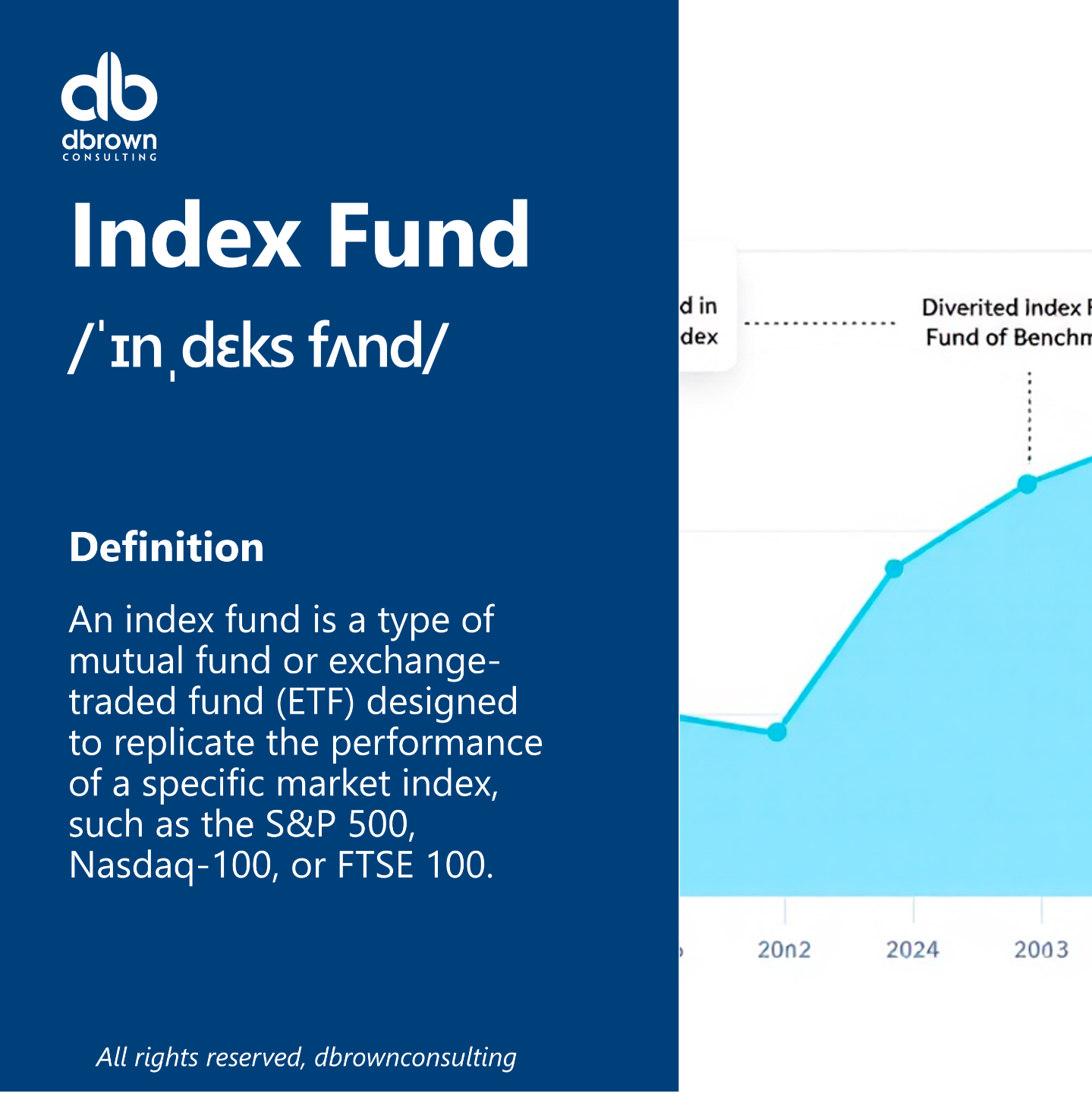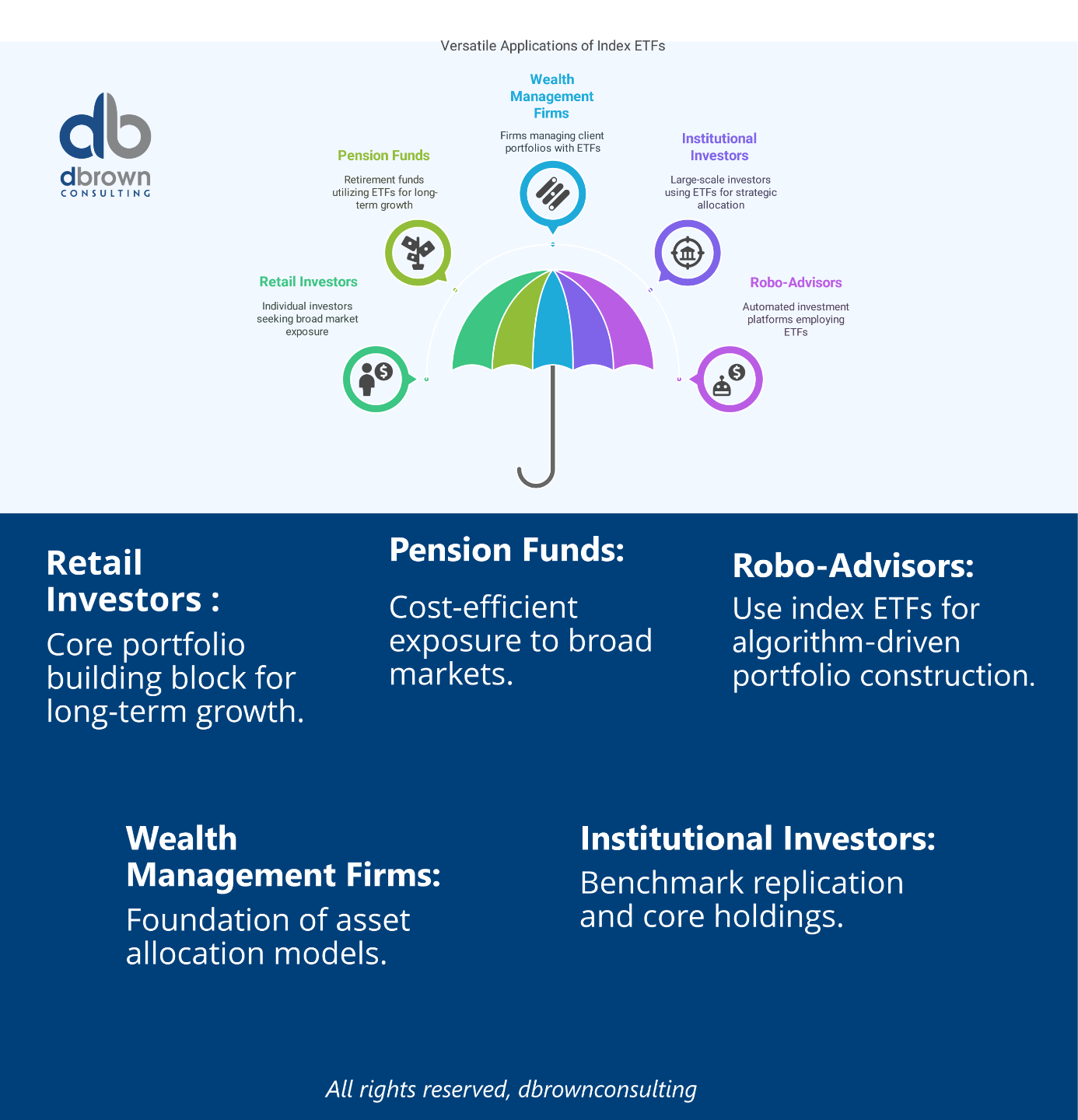Index Fund
Definition
An index fund is a type of mutual fund or exchange-traded fund (ETF) designed to replicate the performance of a specific market index, such as the S&P 500, Nasdaq-100, or FTSE 100. It seeks to match—not beat—the market, by holding all (or a representative sample) of the securities in the target index.
Index funds are a passive investment vehicle with low management fees, often used for broad market exposure, diversification, and long-term investing.
Origins
The concept of index investing was popularized by John Bogle, the founder of Vanguard, who launched the first index mutual fund—the Vanguard 500 Index Fund—in 1976. The strategy gained traction due to its simplicity, cost-effectiveness, and empirical evidence that most active managers underperform the market over time.

Usage
Industry Applications:
-
Retail Investors – Core portfolio building block for long-term growth.
-
Pension Funds – Cost-efficient exposure to broad markets.
-
Wealth Management – Foundation of asset allocation models.
-
Institutional Investors – Benchmark replication and core holdings.
-
Robo-Advisors – Use index ETFs for algorithm-driven portfolio construction.
How Bull Market works
Mechanics of Index Funds:
-
Select a Benchmark Index (e.g., S&P 500).
-
Build a portfolio that mirrors the index's components (full or sampled).
-
Track index performance, rebalancing periodically to maintain alignment.
-
Distribute dividends, if any, to investors.
-
Charge low fees due to passive management (typically < 0.10%).
Index funds rely on market-cap weighting (most common), but may also be:
-
Equal-weighted
-
Price-weighted
-
Fundamentally weighted
Key Takeaways
-
Index funds track market performance, not seek alpha.
-
Offer broad diversification across sectors and geographies.
-
Have low turnover, resulting in low fees and tax efficiency.
-
Ideal for buy-and-hold strategies and retirement portfolios.
-
Cannot outperform the index they follow—only match it minus costs.

Types of Index Funds
| Type | Description |
|---|---|
| Equity Index Funds | Track stock indices (e.g., S&P 500, Russell 2000). |
| Bond Index Funds | Track fixed income indices (e.g., Bloomberg U.S. Aggregate). |
| Global/International Index Funds | Track international markets (e.g., MSCI EAFE). |
| Sector Index Funds | Focus on specific sectors (e.g., tech, healthcare). |
| Smart Beta Funds | Use alternative weighting (e.g., volatility, dividends). |
| ESG Index Funds | Track indices with environmental, social, and governance screens. |
Index Funds & Financial Modeling
Index funds impact:
-
Portfolio Construction:
-
Serve as beta generators (market returns).
-
Used in core-satellite strategies.
-
-
Capital Allocation:
-
Allow strategic weighting across asset classes.
-
-
Performance Attribution:
-
Separate active vs. passive return contributions.
-
-
Benchmarking:
-
Used as performance benchmarks for mutual funds, hedge funds, and advisory portfolios.
-
Nuances & Complexities
-
Tracking Error: The difference between the fund return and the index return due to fees, rebalancing, or sampling.
-
Market-Cap Concentration: Funds like the S&P 500 are heavily weighted toward large-cap stocks (e.g., Apple, Microsoft).
-
Liquidity: ETFs trade intra-day like stocks; mutual index funds trade at NAV end-of-day.
-
Tax Efficiency: ETFs use in-kind redemptions to minimize capital gains distributions.
-
Not Risk-Free: Market risk remains—if the index falls, the fund’s value will too.
Mathematical Formulas
1. Index Fund Return:
2. Expense Ratio Impact:
3. Tracking Error:
Where is the fund return and is the index return.
Master Financial Modeling with the FMA
Change your career today by earning a Globally Recognized Accreditation
Develop real-world financial modeling skills, gain industry-recognized expertise, stand out and start earning more by gaining the Advanced Financial Modeler (AFM) designation from the Financial Modeling Institute.
Our expert-led online cohort based program covers everything you need to become a world class financial modeling pro and advance your career in finance.
Related Terms
-
ETF (Exchange-Traded Fund)
-
Benchmark Index
-
Passive Investing
-
Tracking Error
-
Expense Ratio
-
Market Capitalization
-
Smart Beta
-
Robo-Advisory
References & Sources
Unlock the Language of Finance!
Elevate your financial acumen with DBrown Consulting’s exclusive newsletter. We break down complex finance terms into clear, actionable insights—empowering you to make smarter decisions in today’s markets.
Subscribe Today & Make Financial Jargon Simple!
We won't send spam. Unsubscribe at any time.

